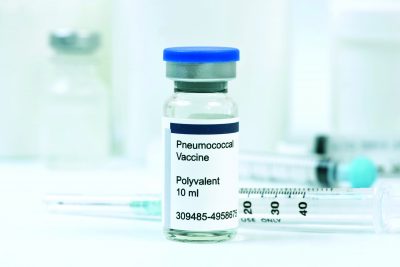Fact: 12.7% of overall deaths in Malaysia in 2017 were caused by pneumonia. – Department of Statistics Malaysia
Pneumonia is the second leading cause of death after ischaemic heart disease in Malaysia. Globally, pneumococcal disease is the leading cause of vaccine- preventable deaths in children under five. One intervention can prevent these statistics from becoming worse: vaccination.
What is pneumococcal disease?
Pneumococcal disease occurs when the body is infected by Streptococcus pneumoniae or commonly known as pneumococcus. It can be divided into two forms: invasive and non- invasive disease. Invasive pneumococcal disease
ranges from pneumonia (lung infection), meningitis (infection of the membranes covering the brain and spinal cord) to septicaemia (blood infection), while non-invasive forms include middle ear infection, sinusitis and throat infection.
Children under the age of two, senior citizens and people with chronic diseases have a higher risk of getting pneumococcal disease, exposing them to serious complications depending on the body part that is infected. This includes brain damage, decreased lung function, hearing loss, mental/ physical disabilities and death.
At what cost?
Pneumococcal disease and its complications present a significant burden to the patient and family. Direct costs include the cost of consultation, medication, hospitalisation, diagnostic tests and surgical interventions, starting from pre-admission care until post- discharge follow-ups. Even if the patient is admitted to a public hospital, it only means that the costs are transferred to the government. Other indirect costs include long-term complications, transportation, accommodation, food, etc.
On top of that, parents also need to worry about taking care of their child. They may need to take time off work, which affects productivity and career stability. Focusing on the sick child with a severe condition may also affect their relationship with other family members. These financial and emotional burdens can disrupt daily lives, causing huge stress on the family, especially among low-to-middle income groups.
To vaccinate or not?
The addition of the pneumococcal vaccine in the National Immunisation Programme (NIP) will provide inclusive protection against pneumococcal disease, especially for the group most at risk: the indigenous people and children living in rural areas, plantation estates and the interiors of Sabah and Sarawak.
Pneumococcal conjugate vaccine (PCV) is recommended by the World Health Organization (WHO) as a priority to be included in routine childhood NIPs. PCV7 (covering 7 pneumococcus strains) was first available in Malaysia in 2005 as an optional vaccine. Later, PCV10 and PCV13 were also introduced in the private market.
There has been gradual progress since then. In 2014, an assessment by the Ministry of Health concluded that PCV is safe, effective and cost-effective, but budget constraints hindered its introduction into the NIP. In 2016, high risk groups started receiving PCV vaccination at the Ministry of Health’s facilities, and in 2017, the Selangor state government included PCV under the Peduli Sihat initiative. Yet, PCV remains excluded from NIP until present.
Is it feasible?

The biggest challenge to this goal is the economic factor. However, a number of studies looking into the feasibility of universal childhood PCV vaccination in Malaysia have shown it is actually cost- effective according to WHO recommended threshold, and beneficial in the long run.
Estimated cumulative benefits over five years:
- Decrease of deaths: 792
- Decrease of invasive pneumococcal disease: 1,920 cases
- Decrease of pneumonia: 58,677 cases
- Decrease of acute otitis media: 322,228 cases
Estimated net savings in direct/indirect medical costs over five years: RM 499 million
Global examples
In South Africa, the introduction of PCV in their NIP reduced 300% of invasive pneumococcal disease cases. In Taiwan, the shift from PCV7 to PCV13 in their NIP led to significant reduction of cases in the elderly and children as the majority of cases was caused by a serotype not covered by the former vaccine.
Although the initial investment will be significant, the number of lives that will be saved is invaluable. Over time, it would translate into savings in direct and indirect medical costs linked to pneumococcal disease and improvement
to the quality of life of the citizens, including reduction in education interruption and increase in productivity.
The good news – the government has announced in the 2020 Budget that a starting sum of RM60 million has been allocated to include pneumococcal vaccination into the NIP. This is the right step by the government and will be an important investment for the future generations and the growth of the nation.
An educational contribution by Malaysian Paediatric Association.







Comments